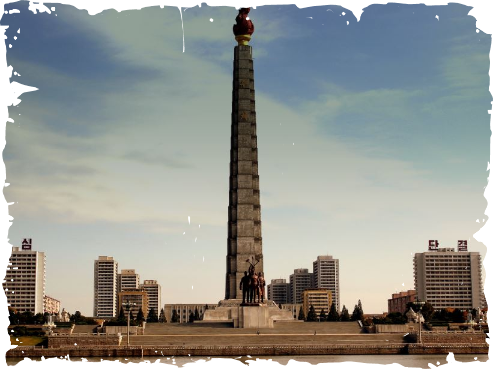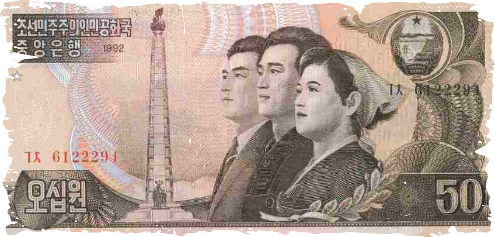Pattern History - Juche Tul
Juche was introduced in 1983, as a replacement for Ko-Dang. General Choi developed the pattern to reflect some of the new techniques that had been perfected in more recent years; while it contains many of the same movements as Ko-Dang it also includes the slow motion kicks, two direction kick, dodging kicks and flying hand attacks. It is also said to challenge the 2nd degree more, as Kodang was considered to be comparatively easy.
In an interview conducted during a visit to Britain in November 1999, General Choi stated: "As new techniques were developed they needed to be represented in the patterns. The pattern Kodang was replaced simply because it represented the latest Korean history, basically last in first out."
General Choi's final years were marked by his efforts to end the seperation between North and South Korea. He introduced Taekwon-Do to North Korea in 1980, and in 1983 he won further favour with the North Korean leader, Kim Il-sung, by changing one pattern from Ko-Dang (named after Cho Man-sik, a North Korean democratic Christian moderate) to Juche (after the isolationist policy of "self-reliance" invented and advocated by Kim Il-sung. Though Choi's intention had presumably been reconciliatory, due to the political climate it went down rather badly in South Korea (which, incidentally, was a repressive military dictatorship at the time under General Chun Doo-hwan, who had seized power in a coup d'état in 1980).
Other commentators, however, point to a more practical motive, claiming the change was made to seek favour with Kim Il-sung in return for financial backing There is still considerable discussion revolving around the use of these two patterns. While Juche is the official pattern given in the ITF syllabus, some clubs (generally the more traditional ones) teach Ko-Dang instead, while some others teach both. The situation is further complicated when organisations require Juche, but allow students to perform Ko-Dang under certain conditions related to age or physical disability.
So what is the philosophical idea behind JUCHE?
Juche - usually translated as "self-reliance", is the official political ideology of North Korea, described by the regime as Kim Il-Sung's "original, brilliant and revolutionary contribution to national and international thought". The idea states that an individual is "the master of his destiny" and that the North Korean masses are to act as the "masters of the revolution and construction".
Kim Il-Sung (1912-1994) developed the ideology – originally viewed as a variant of Marxism-Leninism – to become distinctly "Korean" in character, breaking ranks with the deterministic and materialist ideas of Marxism-Leninism and strongly emphasising the individual, the nation state and its sovereignty. Consequentially, Juche was adopted into a set of principles that the North Korean government has used to justify its policy decisions from the 1950s onwards. Such principles include moving the nation towards "chaju" (independence), through the construction of "charip" (national economy) and an emphasis upon "chawi" (self-defence), in order to establish socialism.
The Juche ideology has been criticized by scholars and observers as a mechanism for sustaining the authoritarian rule of the North Korean regime, justifying the country's heavy-handed isolationism. It has also been attested to be a form of Korean ethnic nationalism, acting in order to promote the Kim family as the saviours of the "Korean Race" and acting as a foundation of the subsequent personality cult surrounding them. In contrast to such criticism and to accusations of seclusion, the North Korean government claims that Juche has become an internationally influential idea and movement, stressing its "influence" in other nations.
Other interesting reading: ITF: Evolution or Separation? Part 2: The changing of Ju che by Master Anslow
In an interview conducted during a visit to Britain in November 1999, General Choi stated: "As new techniques were developed they needed to be represented in the patterns. The pattern Kodang was replaced simply because it represented the latest Korean history, basically last in first out."
General Choi's final years were marked by his efforts to end the seperation between North and South Korea. He introduced Taekwon-Do to North Korea in 1980, and in 1983 he won further favour with the North Korean leader, Kim Il-sung, by changing one pattern from Ko-Dang (named after Cho Man-sik, a North Korean democratic Christian moderate) to Juche (after the isolationist policy of "self-reliance" invented and advocated by Kim Il-sung. Though Choi's intention had presumably been reconciliatory, due to the political climate it went down rather badly in South Korea (which, incidentally, was a repressive military dictatorship at the time under General Chun Doo-hwan, who had seized power in a coup d'état in 1980).
Other commentators, however, point to a more practical motive, claiming the change was made to seek favour with Kim Il-sung in return for financial backing There is still considerable discussion revolving around the use of these two patterns. While Juche is the official pattern given in the ITF syllabus, some clubs (generally the more traditional ones) teach Ko-Dang instead, while some others teach both. The situation is further complicated when organisations require Juche, but allow students to perform Ko-Dang under certain conditions related to age or physical disability.
So what is the philosophical idea behind JUCHE?
Juche - usually translated as "self-reliance", is the official political ideology of North Korea, described by the regime as Kim Il-Sung's "original, brilliant and revolutionary contribution to national and international thought". The idea states that an individual is "the master of his destiny" and that the North Korean masses are to act as the "masters of the revolution and construction".
Kim Il-Sung (1912-1994) developed the ideology – originally viewed as a variant of Marxism-Leninism – to become distinctly "Korean" in character, breaking ranks with the deterministic and materialist ideas of Marxism-Leninism and strongly emphasising the individual, the nation state and its sovereignty. Consequentially, Juche was adopted into a set of principles that the North Korean government has used to justify its policy decisions from the 1950s onwards. Such principles include moving the nation towards "chaju" (independence), through the construction of "charip" (national economy) and an emphasis upon "chawi" (self-defence), in order to establish socialism.
The Juche ideology has been criticized by scholars and observers as a mechanism for sustaining the authoritarian rule of the North Korean regime, justifying the country's heavy-handed isolationism. It has also been attested to be a form of Korean ethnic nationalism, acting in order to promote the Kim family as the saviours of the "Korean Race" and acting as a foundation of the subsequent personality cult surrounding them. In contrast to such criticism and to accusations of seclusion, the North Korean government claims that Juche has become an internationally influential idea and movement, stressing its "influence" in other nations.
Other interesting reading: ITF: Evolution or Separation? Part 2: The changing of Ju che by Master Anslow

Above: The Juche Idea Tower, Pyongyang, DPR, North Korea.

Above: The Juche Idea Tower on the North Korean 50 Won note.
Lets compare Ko-Dang and Juche Tul (see videos below):


